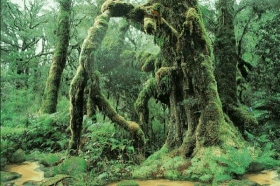Biodiversity loss matters, communication is crucial

Communicating why biodiversity loss matters for people is essential
for reversing it.
The failed UN climate talks in Copenhagen in December could hardly have
been a less promising prelude to the International Year of Biodiversity,
which opened last month (January).
As with climate change, the threat of large-scale biodiversity loss —
and the need for global political action to stop it — is growing every
day.
At a meeting about biodiversity organised by the British government in
London in January, Robert Watson, former head of the Intergovernmental
Panel on Climate Change (IPCC), warned that damage to the natural
environment was approaching "a point of no return", a familiar phrase in
the climate change debate.
Both issues face formidable challenges in persuading political leaders
and the public of the urgent need to take action. The reasons are
complex. But at root is the conflict between the need to radically
change our use of natural resources and the desire to maintain current
forms of economic growth in both developed and developing countries.
The solutions are equally complicated. Part of the answer, in each case,
lies in enhancing the media's ability to communicate messages emerging
from the underlying science, so that these accurately reflect both the
urgency of the situation, and how ordinary people's lives may be
affected.
Re-setting targets
Getting these messages across is no easy task. And so far, in the case
of biodiversity, efforts have largely failed.
It is already clear that governments signed up to the Convention on
Biological Diversity (CBD) have missed their 2010 target, set in 2002,
of achieving "a significant reduction in the rate of biodiversity loss".
As delegates to the London conference and other meetings held to launch
the Year of Biodiversity have freely admitted, this failure to act
partly results from shortcomings in communication. The scientific
community has not been able to effectively communicate its concerns to
decision-makers — at least not in a way that sufficiently prioritises
biodiversity conservation within a political agenda predominantly
concerned with employment and economic growth.
Discussions on a new set of targets for protecting biodiversity over the
next decade are already well under way, and are due to be agreed in
October at the next CBD review conference, to be held in Nagoya, Japan.
The new targets must not only be more realistic and concrete, but must
also be accompanied by a more sophisticated communications strategy.
Missed connections
This strategy must address the weaknesses found in current approaches.
For example, the issues scientists think most important often seem
abstract and far removed from the day-to-day concerns of ordinary
people. The rate at which the world is losing species is a typical
example.
Even the term 'biodiversity' suffers from this weakness, lacking the
concreteness of concepts such as sea level rise. Some media advisers
even suggest avoiding the term wherever possible for that very reason —
not very promising to those trying to create a global campaign around
the same word.
Too much media coverage of biodiversity fails to connect with the issues
directly affecting people's lives. Even concepts such as 'the web of
life', used to emphasise the interrelatedness of living systems, does
not immediately explain why we should be worried about the declining
number of insects or plants in distant locations.
Finally the apocalyptic tone sometimes used in attempts to drive a
message home can further hinder the case for constructive action. Too
often, it promotes either cynicism or apathy among those who cannot
relate these disaster scenarios to their own personal experience.
Climate change campaigners have experienced this in recent months,
when trying to make the case for preventing global warming during the
coldest winter that the northern hemisphere has experienced for several
decades.
Hard science, compelling reasons
Forging an effective communications strategy that avoids these pitfalls
is clearly one of the biggest challenges facing the biodiversity
community as it plans for the next decade.
And if researchers are to rise to the challenge, they must first firm-up
the scientific case for action. The damage that recently-aired
scientific flaws are causing climate change campaigns is a reminder
that, with the stakes as high as they are, sloppy scientific reasoning
can have a broad and lasting impact.
Equally important is the need to embed this scientific evidence into
viable but sustainable economic growth and development strategies. And
that means generating a public discourse that directly relates the needs
of the environment to social priorities such as jobs, food and health.
The components for such a dialogue — such as how natural products are
potential sources of new medicines — already exist. But much more needs
to be done to forge these into a viable and effective political strategy
to reverse current trends.
If the failure in Copenhagen can act as a wake-up call to the
biodiversity community, that itself will have been a positive
achievement.
David Dickson
Director, SciDev.Net
SciDev.Net is a charity registered in England and Wales. Registration number: 1089590
© 2010 SciDev.Net To subscribe or visit go to: http://www.scidev.net